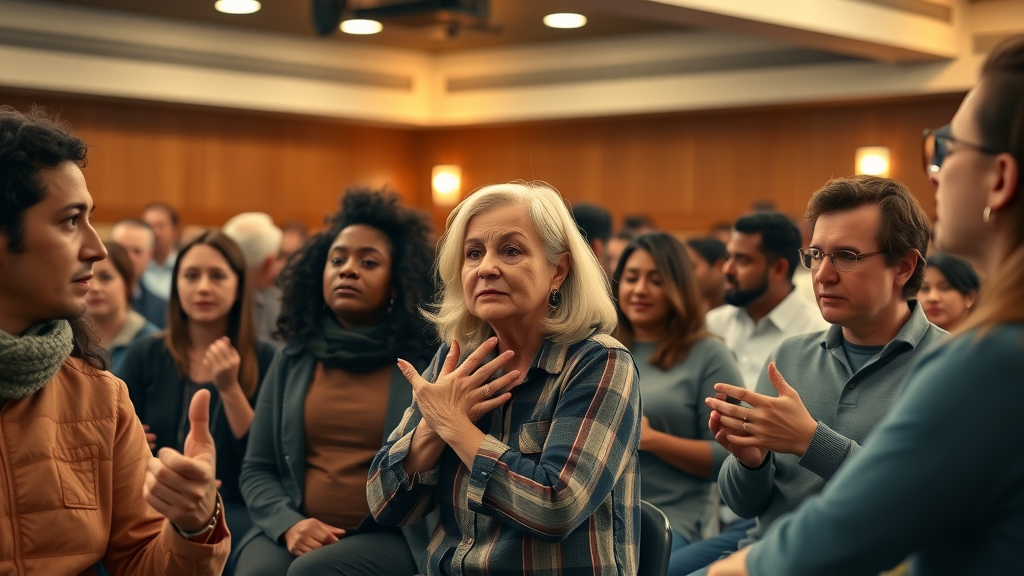Did you know that one in five adults experiences mental illness each year ? This surprising statistic shines a glaring spotlight on the urgent need for mental health awareness . For far too long, mental wellbeing has lingered in the shadows, overshadowed by stigma and misconceptions. In this article, you'll learn why addressing mental health is more than a personal concern—it's a societal responsibility that demands immediate attention and action.
The Unseen Crisis: Why Mental Health Awareness Demands Attention
Mental health awareness is more critical than ever. Despite advances in health care and wellness, millions continue to suffer silently from mental health issues—often in isolation. Each year, one in five adults faces a mental illness, underscoring the widespread nature of these conditions. This isn't just an individual challenge; it's a public health issue that affects families, communities, and workplaces alike. Without proper mental health care and education, individuals risk falling through the cracks, which can have lifelong repercussions for well-being.
The stigma surrounding mental illness frequently discourages people from seeking help and leads to discrimination in both professional and personal settings. Heightened mental health awareness is essential to changing this narrative. By shining a light on these issues, we can reduce the stigma, educate the public, and make a difference in how societies respond. This article explores the essentials of awareness, how it impacts individuals and societies, the vital role of awareness months , and robust, actionable steps you can take to support the movement for mental well-being.

- Discover the shocking statistic that 1 in 5 adults experiences mental illness each year—a wake-up call to the importance of mental health awareness.
- Explore what you’ll learn in this article: the essentials of mental health awareness, how it affects individuals and societies, the role of awareness months, and actionable steps for positive change.
Defining Mental Health Awareness: Recognizing the Need For Change
Mental health awareness goes beyond simply acknowledging the existence of mental illness—it's about understanding the complexities of different mental health conditions and recognizing the societal barriers people face. Unlike general health awareness , which might focus on physical ailments and preventive measures, mental health awareness emphasizes open discussions about emotional well-being, mental health care, and access to health services for those affected by mental illness.
Increased awareness leads to real, measurable change. Communities that embrace mental health discussions are more likely to have robust mental health services and improved access to health care. This, in turn, empowers individuals affected by mental illness to seek help, advocates for better health policy, and pushes for an inclusive environment where everyone has a chance to thrive. Effective mental health campaigns during health awareness month and mental health awareness month have shown success in educating the public, raising awareness, and driving healthier outcomes.
- Understand the core meaning of mental health awareness and its distinction from general health awareness.
- Learn how increased awareness leads to better mental health care, improved health services, and support for those facing mental illness.
A Deep Dive Into Mental Health: More Than Just the Absence of Illness
Mental Health versus Mental Illness: Key Differences and Overlaps
While often used interchangeably, mental health and mental illness are distinct yet interconnected. Mental health refers to an individual's overall emotional, psychological, and social well-being. It's about how we think, feel, act, and handle stress or relationships. Mental illness , on the other hand, involves health conditions that impact mood, behavior, or thinking—such as depression, anxiety, or bipolar disorder. Awareness is crucial for both: understanding the spectrum helps identify when you or someone you know might need support or health care .
Addressing only mental illness without recognizing ways to maintain positive mental health overlooks an essential part of wellness. Whether during mental health month or other awareness month campaigns, it's important to recognize the overlapping needs. People may not have an official diagnosis but might still struggle with mental health issues and need support. Strengthening mental health awareness creates a culture where everyone—from those living with mental health conditions to those affected by temporary stressors—feels safe to seek help.
In fact, mental health challenges can sometimes manifest in unexpected ways, such as individuals feigning physical symptoms to cope with underlying stress or emotional struggles. For a deeper look at how behaviors like faking being sick may reveal deeper health issues , explore the psychological factors that often go unnoticed.

- Examine the relationship between mental health and mental illness and why awareness is crucial for both.
- Analysis of competing health awareness month initiatives and their impact on society.
The Power of Awareness Months: Mental Health Awareness Month and Beyond
How Mental Health Awareness Month Mobilizes Societal Change
Mental Health Awareness Month is much more than a symbolic event—it's a catalyst for real societal transformation. Each May, individuals, organizations, and communities unite to bring attention to issues like mental illness , the need for mental health services , and the importance of health care for all. Diverse campaigns across social media and local events encourage people to speak openly about their struggles and successes. By spreading awareness, mental health awareness month challenges outdated stereotypes and helps reduce the stigma that often holds people back from seeking help.
Other awareness months, such as National Suicide Prevention Month or general health awareness month , also play powerful roles in educating the public and shifting community perspectives. By comparing these initiatives, it becomes evident that while their focuses may differ—ranging from mental well-being to broader health issues —all serve as vital platforms to make a difference and advocate for better health outcomes. Their combined reach ensures that more people are informed, more conversations are had, and more lives are touched.
| Awareness Month | Focus | Reach | Effectiveness |
|---|---|---|---|
| Mental Health Awareness Month | Mental Health, De-stigmatization | National/International | High: Broad campaigns, significant public engagement, lasting impact |
| Health Awareness Month | General Health, Preventive Care | National | Moderate: Educational resources, community activities |
| National Suicide Prevention Month | Suicide Prevention, Mental Health | National | High: Crisis resources, increased hotline engagement, direct support |
| Other Health Months (e.g., Breast Cancer, Heart Health) | Specific Diseases, Screening, Prevention | National/International | High: Focused campaigns, research funding, screening increased |
Breaking the Silence: The Role of Public Conversation in Mental Health Awareness

Open public conversations are pivotal in changing societal attitudes toward mental health and mental illness . By sharing personal stories, individuals provide hope and validation to others quietly struggling. Social and traditional media coverage can further amplify these voices, gradually shifting the narrative from shame and secrecy to understanding and acceptance. Through honest dialogue, communities can raise awareness , reduce the stigma, and inspire others to seek the help they need.
Storytelling isn't just emotionally impactful—it also challenges misconceptions and creates advocacy opportunities. When people understand that they are not alone—and that mental health conditions can affect anyone—it encourages greater empathy and connection. Mental health awareness month and similar initiatives often spotlight such stories, making a difference one conversation at a time.
"Mental health awareness is not just a campaign—it’s a movement for dignity and understanding."
- Analyze how personal stories and media coverage shift the narrative on mental illness and mental health.
The Five C’s of Mental Health: Foundations of a Healthy Mind

Building a framework for better mental health involves embracing the five foundational C’s: Connection, Coping, Compassion, Community, and Care . These pillars support people living with mental health conditions and anyone aiming to boost their mental resilience. Connection fosters a sense of belonging, Coping equips individuals with tools to navigate stress, Compassion for oneself and others nurtures healing, Community offers collective support, and Care ensures regular attention to both physical and emotional well-being.
Effective mental health awareness campaigns highlight these values, encouraging practical steps to weave them into everyday life. Whether through support networks, mindfulness activities, or community volunteerism, prioritizing the 5 C’s leads to stronger, more resilient individuals and societies. When implemented consistently, these components create a blueprint for living well—regardless of whether someone is currently affected by mental illness.
- Explore the 5 C’s—Connection, Coping, Compassion, Community, and Care—and their role in boosting mental health awareness and support.
- List of practical steps to implement the 5 C’s in daily life.
How to Improve Your Mental Health: Everyday Strategies for Better Wellbeing
Caring for your mental health is an ongoing journey that requires intentional effort and informed choices. Evidence-based techniques—like practicing mindfulness, establishing healthy routines, and seeking professional mental health services —are proven to enhance wellbeing. Small actions, such as regular exercise, journaling, and reaching out to supportive friends or family members, can help you manage your mood and reduce feelings of isolation.
Participating in mental health awareness month activities can also strengthen your support network and expose you to valuable resources. Don’t hesitate to access health care or call or text a trusted helpline if you need guidance. Buidling strong social connections and prioritizing self-care are foundational to maintaining balance, especially during stressful periods. Each positive step you take is an investment in a healthier, more empowered future.
- List of evidence-based techniques for enhancing mental health: mindfulness, seeking mental health services, building supportive relationships, accessing health care.
Prevention First: How to Prevent Mental Health Challenges

Prevention is key in addressing mental health challenges . Proactive steps—such as regular mental health screenings, early intervention for emerging issues, and participation in educational initiatives during health awareness month —can significantly lower the risk of severe or prolonged mental illness. Personal habits like maintaining a balanced lifestyle, managing stress, and setting realistic goals also contribute to preventive care.
At the community level, advocacy is essential. Creating supportive environments, partnering with organizations like the National Alliance on Mental Illness , and championing inclusive policies during mental health awareness month all serve as preventive measures. By encouraging open conversations and taking a proactive approach to mental health, we ensure that fewer people will suffer needlessly and more will thrive.
- Explore the proactive steps individuals and communities can take to prevent mental illness, from early screening to advocacy during health awareness month.
The National Alliance on Mental Illness: Leading the Charge

The National Alliance on Mental Illness (NAMI) is a trailblazer in the fight for comprehensive mental health awareness and policy reform. Through education, support services, and powerful advocacy, NAMI and the broader alliance on mental health ensure that people affected by mental illness have access to vital resources and that mental health remains a priority in health care policy. Their work at the local and national level includes public education campaigns, peer support initiatives, and dedicated crisis response strategies during mental health awareness months .
By fostering collaboration with policymakers, health care providers, and communities, the National Alliance on Mental Illness creates an environment where mental health is recognized, respected, and supported. Their ongoing commitment to raising awareness, improving access to health services, and fighting for legislative changes shapes a future where nobody is left behind because of a mental health condition.
- Profile the work of the National Alliance on Mental Illness (NAMI) and the broader alliance on mental health to raise awareness, provide resources, and influence health care policy.
People Also Ask About Mental Health Awareness
What is the mental health awareness?
- Mental health awareness refers to understanding mental health, recognizing signs of mental illness, and promoting health care and resources for those affected. It also aims to reduce stigma and encourage open conversation about wellbeing.
What are the 5 C's of mental health?
- The 5 C's are Connection, Coping, Compassion, Community, and Care —essential components for strengthening mental health awareness and resilience. Each plays a unique role: Connection combats isolation, Coping equips you with tools for stress, Compassion fosters acceptance, Community rallies collective support, and Care ensures proactive wellbeing.
How can you improve your mental health?
- You can improve your mental health through regular exercise, practicing mindfulness, seeking help from mental health services , maintaining strong social connections, and participating in health awareness month activities. These steps promote balance, reduce stress, and foster resilience in challenging times.
How to prevent mental health problems?
- Preventing mental health problems involves early intervention, fostering supportive environments, education through mental health awareness programs, and regular self-care. Taking these proactive steps helps preserve mental wellbeing and minimizes the risk of more serious health concerns.
Frequently Asked Questions About Mental Health Awareness
- What are common signs of mental health struggles? Signs may include persistent sadness, withdrawal from social activities, drastic mood changes, sleep disturbances, and difficulty coping with daily life. Recognizing these signs is vital for early intervention and providing support to those in need.
- Where can you find mental health services? You can access mental health services through local health care providers, community clinics, school counselors, and organizations like the National Alliance on Mental Illness (NAMI). Many helplines are also available to call or text for immediate assistance and guidance.
- How can you support awareness month campaigns? Support by sharing credible information on social media, participating in fundraiser walks, joining awareness events, and volunteering with local organizations. Each action helps amplify the importance of mental health awareness month and extends its reach.
Take Action: Champion Mental Health Awareness Today
- Get involved in mental health awareness month through community events, education programs, or donating to reputable organizations.
- Join relevant alliances such as NAMI and advocate for comprehensive health care and mental health reforms.
- Share your story and support others to break the silence on mental health struggles.
- Make a difference by encouraging conversations in everyday settings—be it at home, school, or work.
Reflecting Forward: The Lasting Impact of Greater Mental Health Awareness
- Expanding mental health awareness yields personal and societal benefits—from building resilience and reducing stigma, to ensuring that more people access the support they need. Stay engaged: keep the conversation going and commit to positive change, every day.
As you continue your journey toward greater mental health awareness, consider how holistic well-being can be supported by a variety of lifestyle choices and relationships. For example, even the companionship of pets has been shown to offer significant emotional benefits, as highlighted by Olympic champion Simone Biles. If you’re interested in exploring how animals can play a role in mental wellness, discover the mental health benefits of pets and how they help us thrive . Expanding your understanding of these diverse strategies can empower you to build a more resilient, balanced, and fulfilling life.
 Add Row
Add Row  Add
Add 




Write A Comment